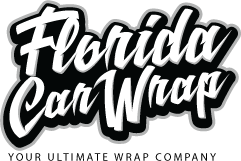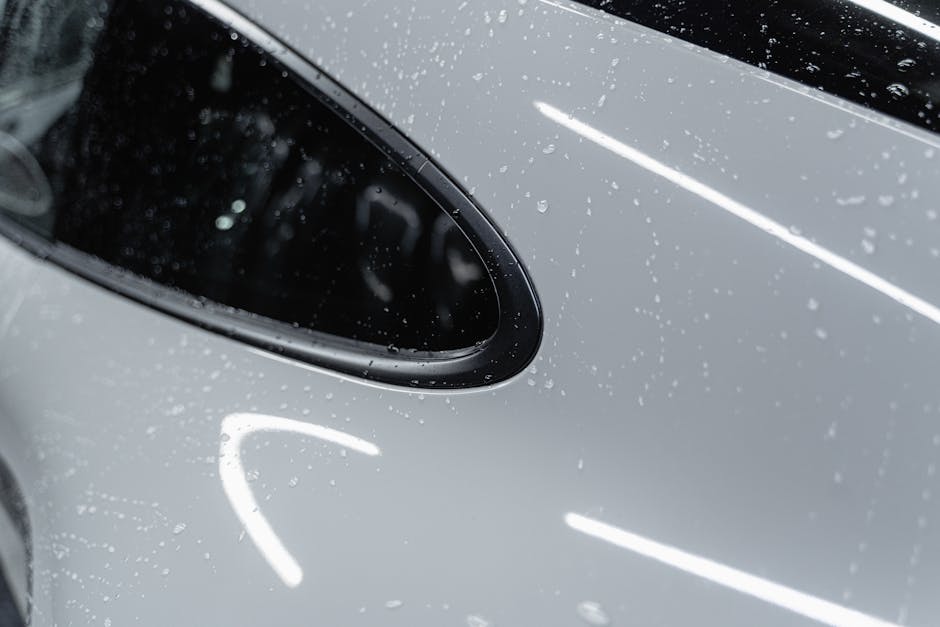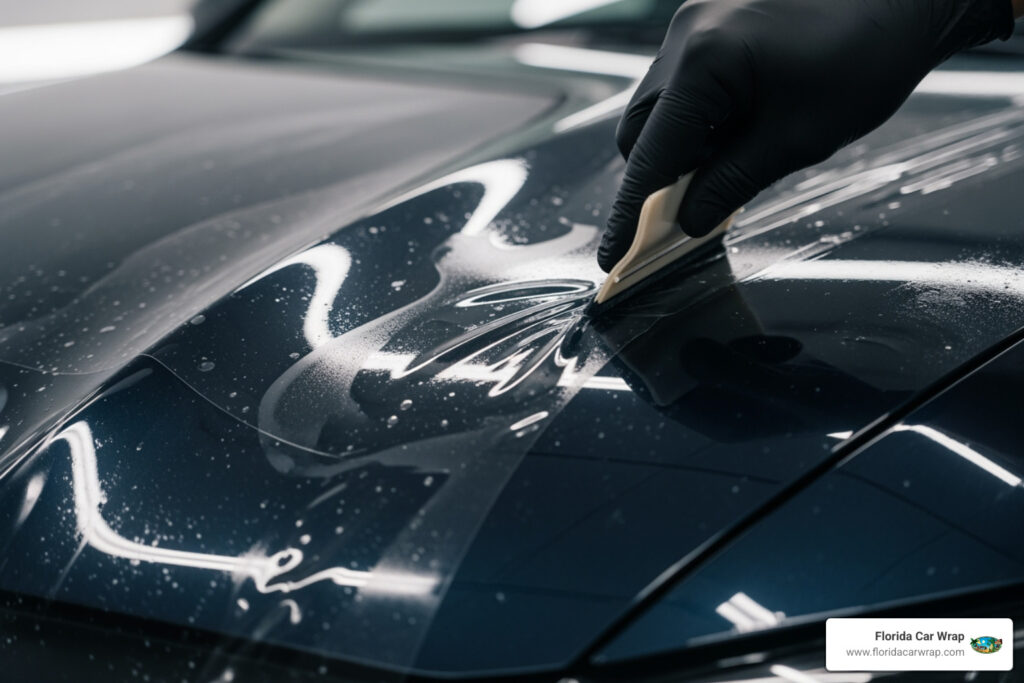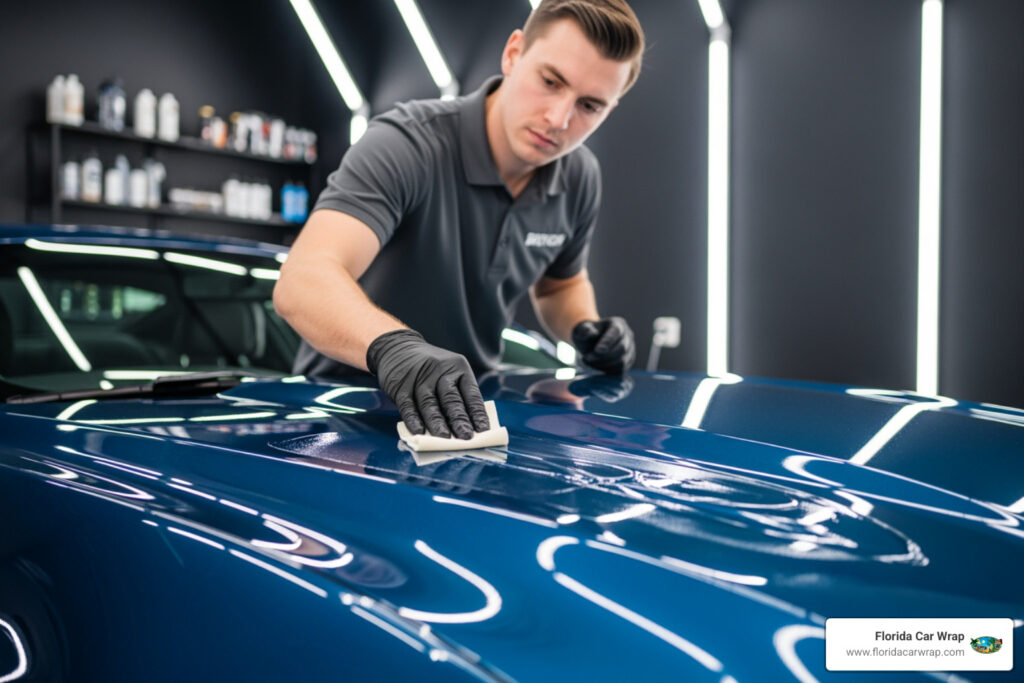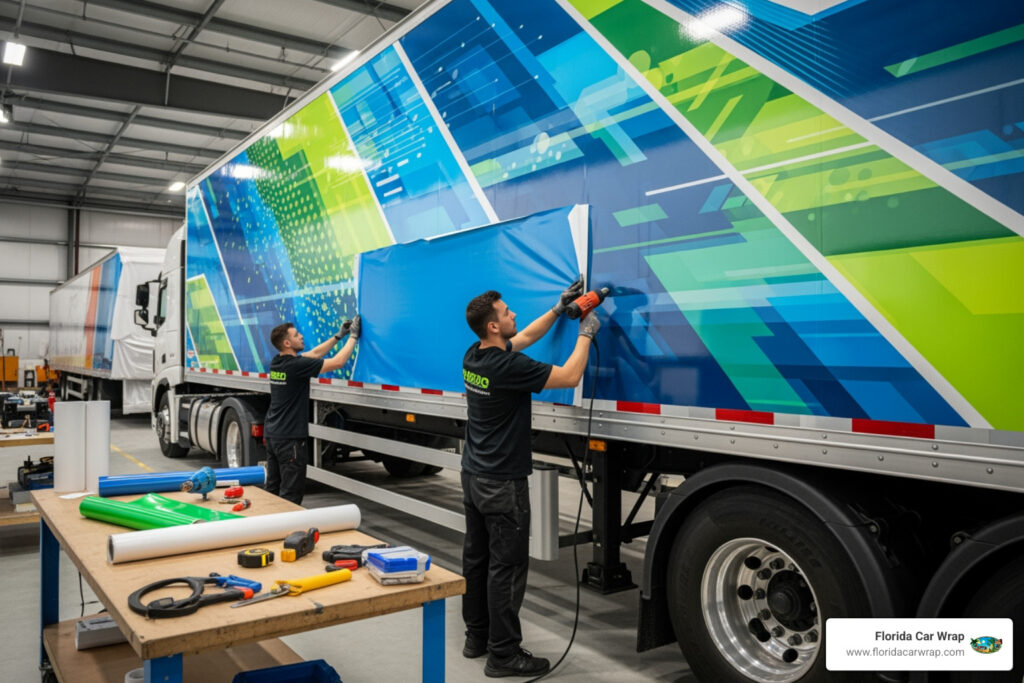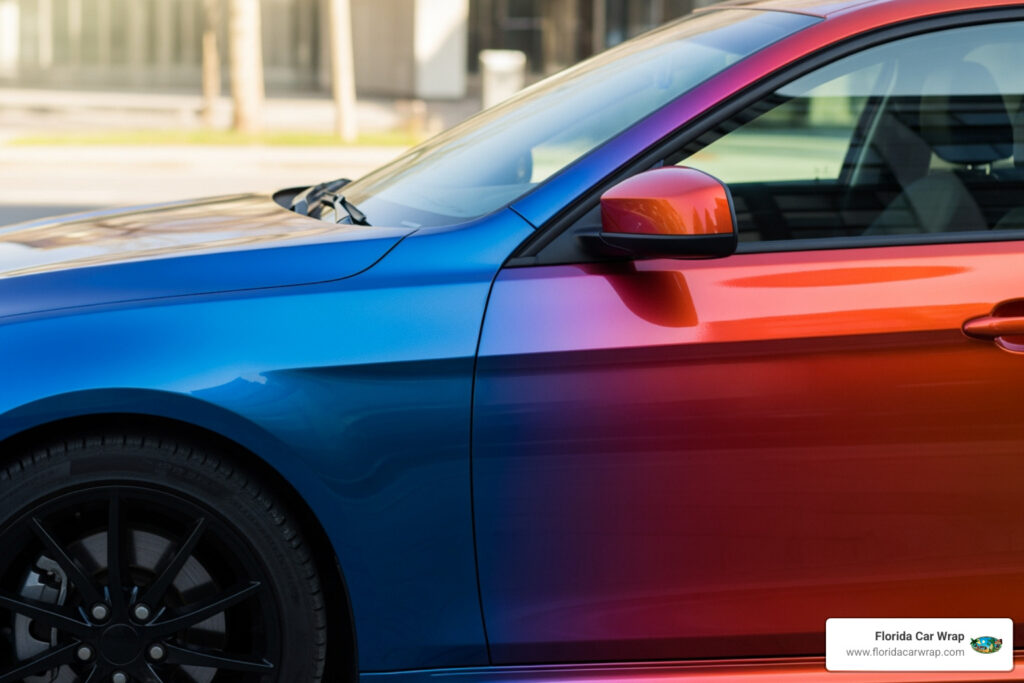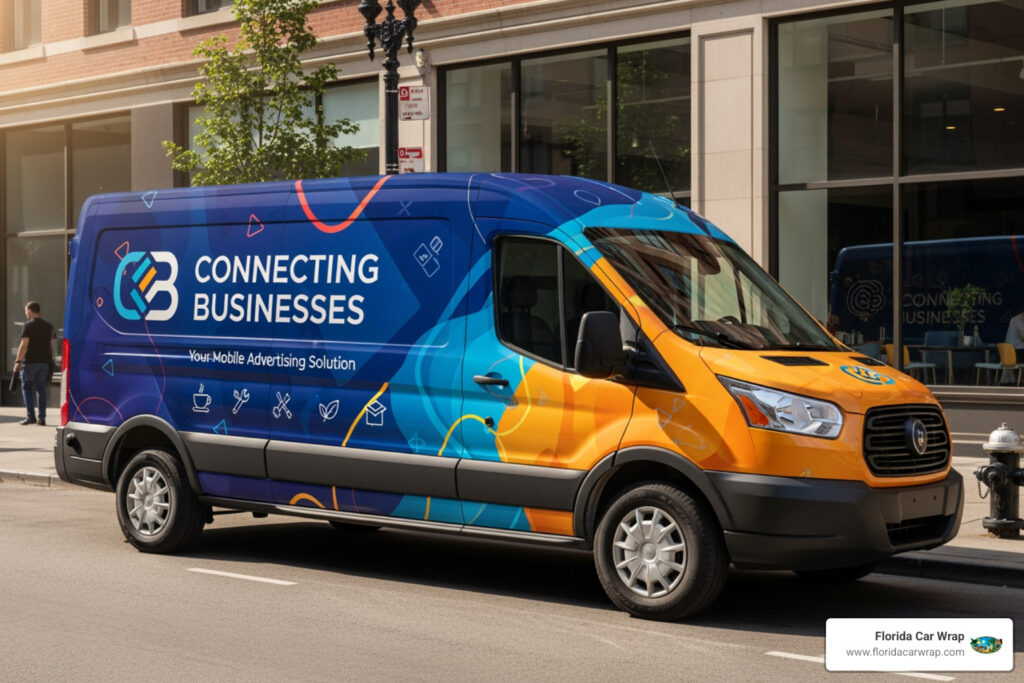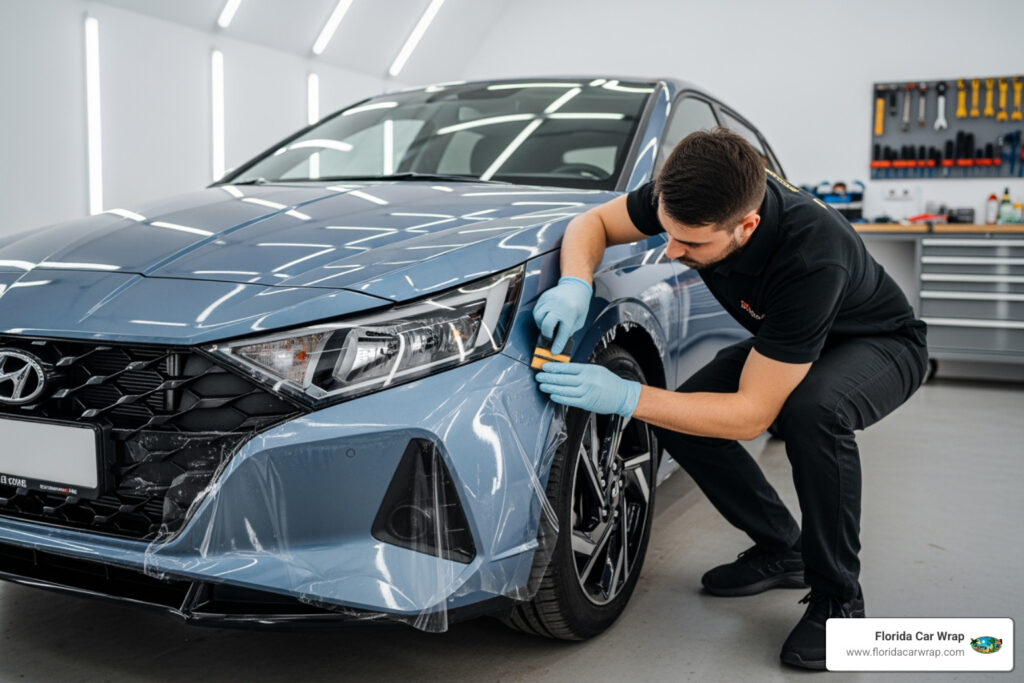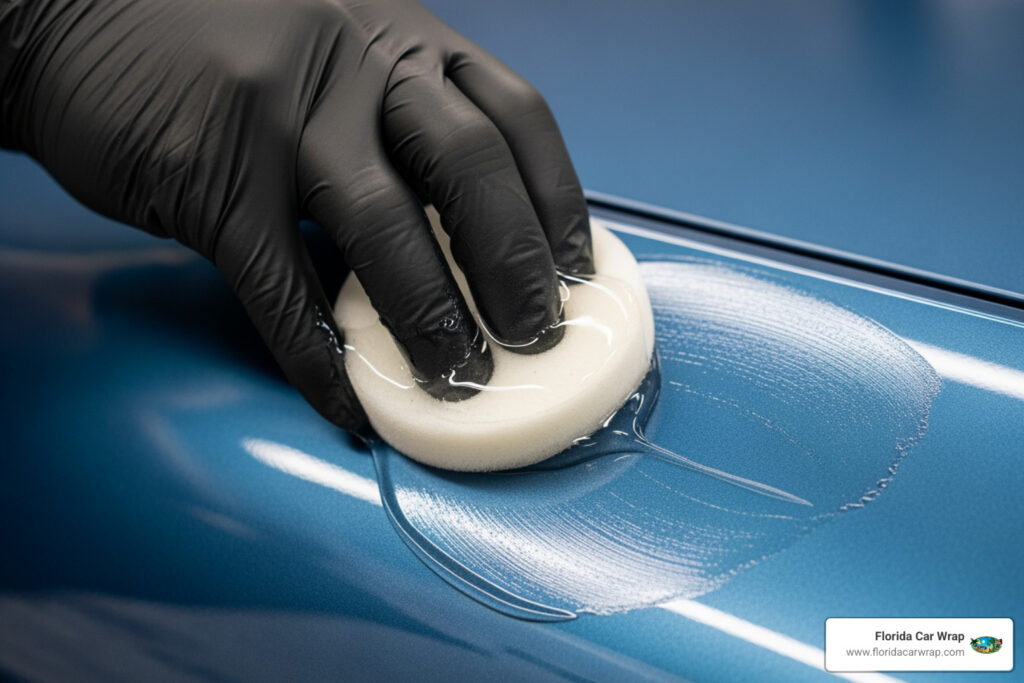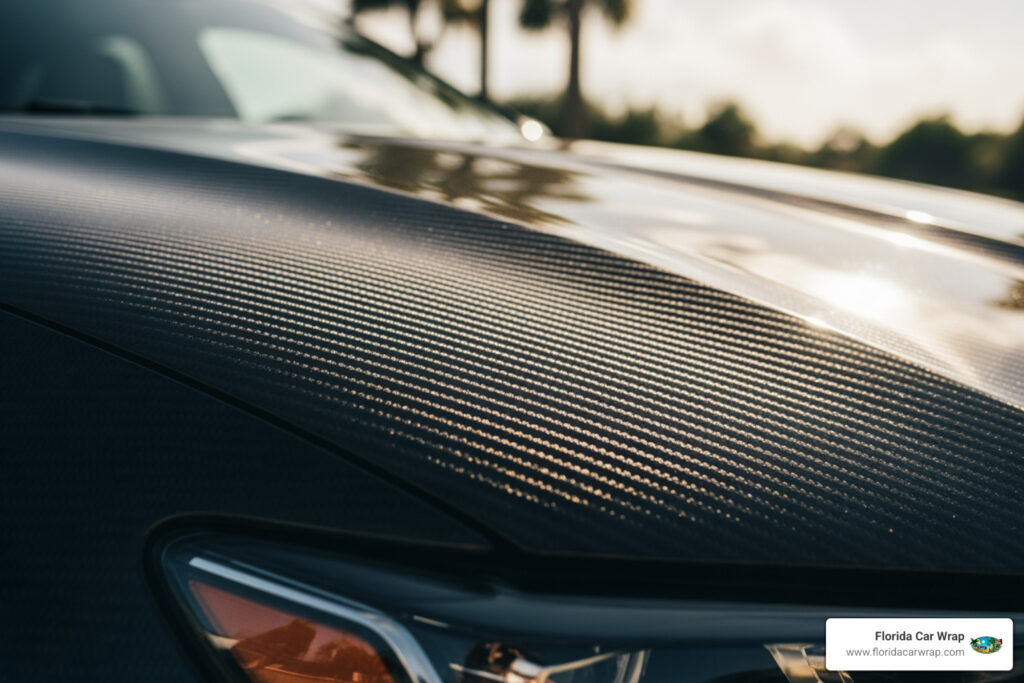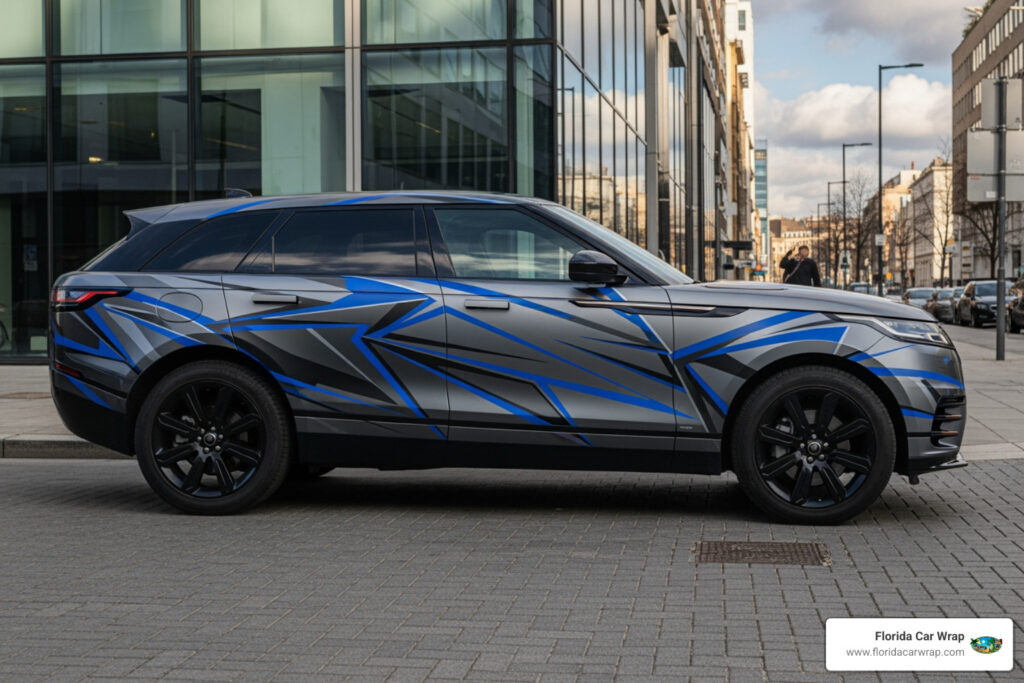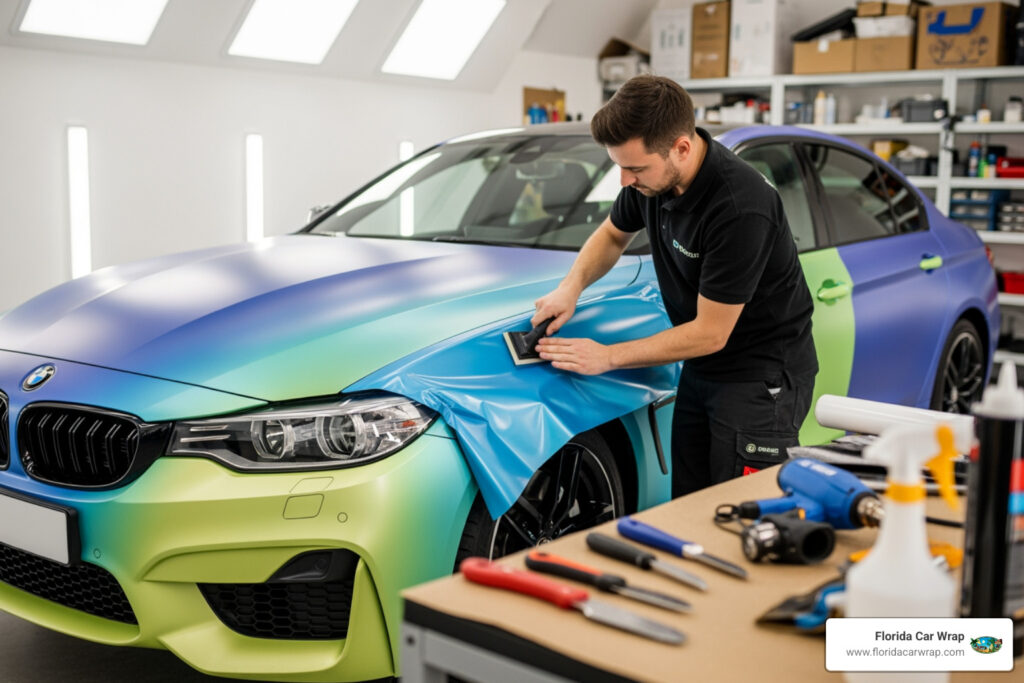Why Protecting Your Car’s Paint is More Critical Than Ever
Best car protection coating options have evolved dramatically. Choosing the right one can save you thousands in repair costs while keeping your vehicle looking showroom-new for years. Here’s a quick overview:
Quick Answer: Top 3 Protection Methods
| Protection Type | Best For | Lifespan | Cost Range |
|---|---|---|---|
| Ceramic Coating | Long-term shine & chemical protection | 2-9 years | $500-$2,000 |
| Paint Protection Film (PPF) | Physical damage (chips, scratches) | 5-10 years | $1,000-$5,000 |
| Traditional Wax | Budget-friendly, short-term shine | 3-4 months | $50-$200 |
Your car’s paint faces a constant assault from UV rays, bird droppings, acid rain, and road salt. Without proper protection, your paint can fade, oxidize, and develop permanent damage within a few years.
While traditional car wax was once the only option, it wears off in months and offers minimal defense. Modern ceramic coatings changed everything by creating a chemical bond with your vehicle’s clear coat. This forms a semi-permanent protective layer that’s significantly harder and more durable than wax.
However, not all coatings are equal. DIY products might last 6-18 months, while professional-grade ceramic coatings can protect your vehicle for 2-9 years. This guide breaks down everything you need to know to choose the right solution for your needs and budget.
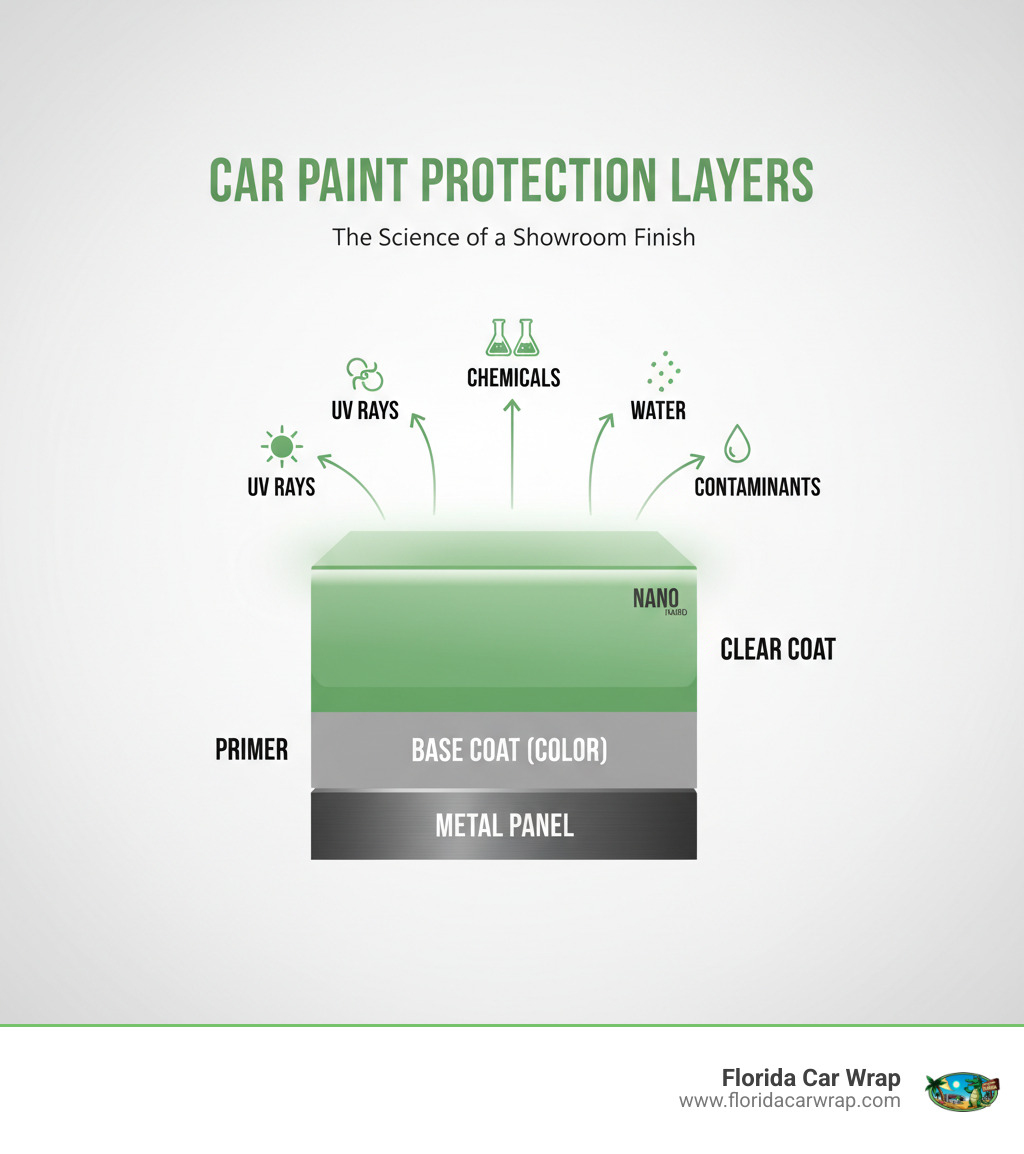
What is a Ceramic Coating and Why Do You Need One?
Think of a ceramic coating as a second, lab-engineered clear coat that’s tougher and slicker than factory paint. At its core, a ceramic coating is a liquid polymer that uses nanotechnology to form a rock-hard protective layer once applied.
Unlike wax that just sits on the surface, a ceramic coating forms a chemical bond with your factory clear coat. The key ingredient is Silicon dioxide (SiO2), which gives the coating its incredible hardness and durability. This molecular bonding creates a semi-permanent shield that becomes part of your car’s exterior.
So, why do you need one? Your car faces a daily assault from UV rays that cause fading, plus acidic contaminants like bird droppings and tree sap that can permanently etch your paint. A ceramic coating provides a powerful defense:
- UV Ray & Chemical Resistance: It acts as a shield against sun damage and prevents acidic contaminants from eating into your clear coat.
- Hydrophobic Properties: The coating creates an incredibly smooth surface that repels water. Rain beads up and rolls off, taking dirt with it, which dramatically reduces water spots and makes washing easier.
- Improved Gloss: A professionally applied coating delivers a deep, wet-looking shine that improves your paint’s color and depth.
- Minor Scratch Resistance: With a hardness rating up to 9H on the pencil scale (compared to 2H-4H for a clear coat), it helps resist swirl marks from washing and light abrasions.
Bottom line: A best car protection coating like ceramic actively preserves your investment while making maintenance far easier. For comprehensive Ceramic Surface Protection, it’s the modern solution that delivers on its promises.
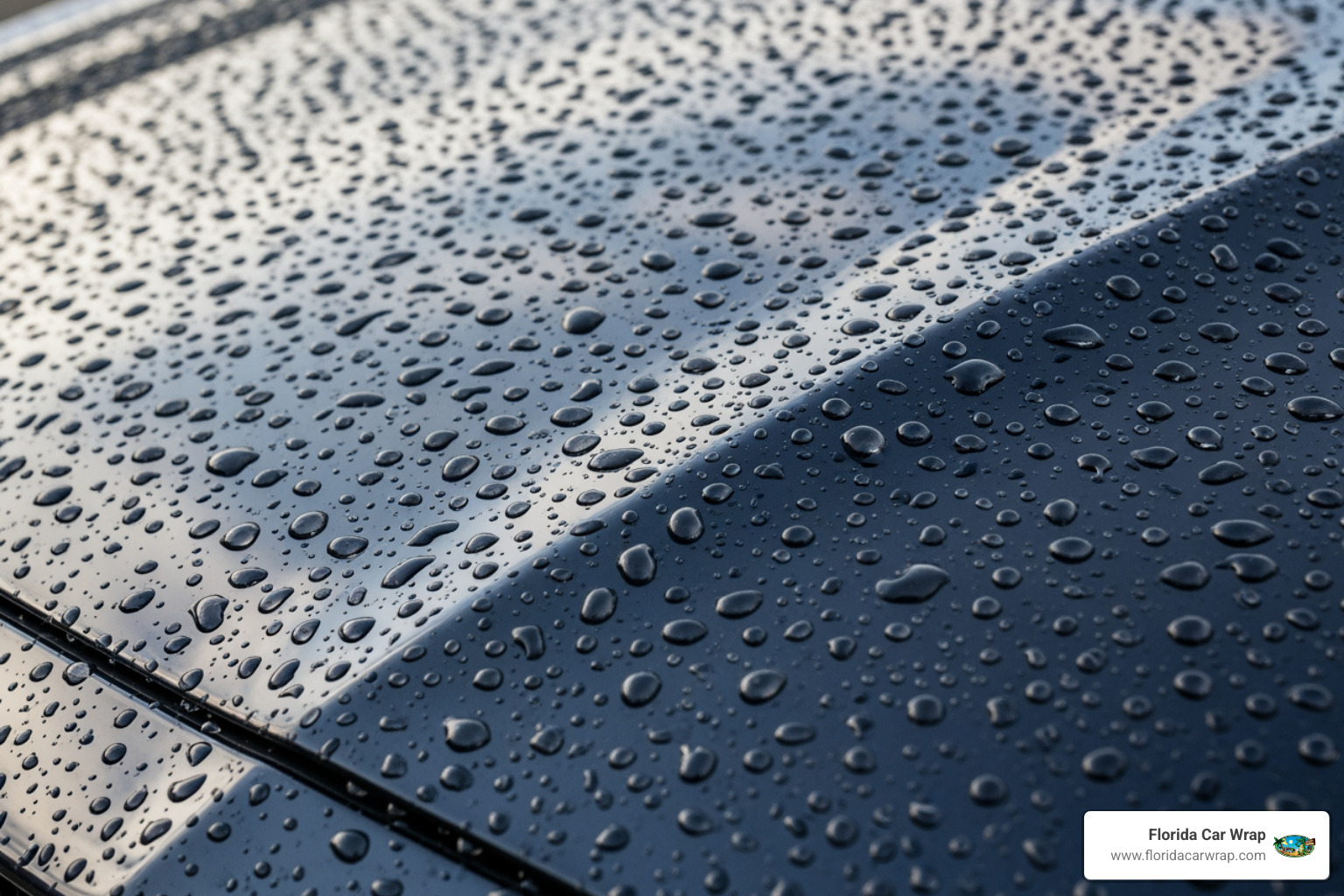
Comparing the Top Car Paint Protection Methods
Choosing the best car protection coating means understanding the strengths of each option. Let’s compare the three main choices: traditional wax, ceramic coatings, and Paint Protection Film (PPF).
| Protection Type | Durability | Protection Level | Appearance | Average Cost (DIY/Pro) |
|---|---|---|---|---|
| Traditional Wax | 3-4 months | Minimal (UV, light contaminants) | Good shine, warm glow | $20-$50 (DIY) |
| Ceramic Coating | 2-9 years | Excellent (UV, chemical, minor scratches, stains) | Deep, glass-like shine, improved color depth | $20-$100 (DIY) / $500-$2,000 (Pro) |
| Paint Protection Film | 5-10 years | Superior (rock chips, deep scratches, scuffs) | Maintains factory finish, can add gloss or matte | $1,000-$5,000 (Pro) |
Traditional Car Wax
Car wax is the most accessible and affordable entry point, perfect for DIY enthusiasts on a budget. It sits on top of your paint, providing a temporary warm glow and some water beading. However, its protection is minimal and its lifespan is short, typically lasting only 3-4 months before it breaks down. It offers almost no defense against chemical etching or serious UV damage, making it more of a cosmetic treatment than a long-term protective solution.
Paint Protection Film (PPF)
For superior protection against physical damage, Paint Protection Film is the answer. Often called a “clear bra,” PPF is a thick, transparent urethane film that absorbs the impact of rock chips, door dings, and scratches. High-quality films even have self-healing properties, where light scratches disappear with heat. While PPF is the ultimate defense against physical threats, it comes at a higher cost ($1,000-$5,000) and requires professional installation. For total protection, many owners apply a Ceramic Coat over the PPF.
Ceramic Coatings: The Modern Protective Solution
Ceramic coatings offer a fantastic balance of performance, durability, and value. Unlike wax, a ceramic coating forms a chemical bond with the paint, creating a semi-permanent layer that lasts for years, not months. It provides a robust barrier against UV rays, chemical stains from bird droppings and tree sap, and oxidation. The result is a deep, glass-like shine and incredible hydrophobic properties that keep your car cleaner for longer. While it won’t stop rock chips like PPF, it offers outstanding Ceramic Protection against environmental and chemical damage, making it the best car protection coating for most drivers seeking serious, long-lasting results.
Finding the Best Car Protection Coating for Your Vehicle
How do you find the best car protection coating when so many options exist? The best choice is one that matches your budget and expectations and, most importantly, is applied correctly.
Key Factors in Choosing a Ceramic Coating
When comparing coatings, here’s what actually matters:
- SiO2 vs. Graphene Concentration: Silicon dioxide (SiO2) is the core ingredient providing hardness. Professional coatings have much higher concentrations (often over 80%) than DIY products. Graphene is a newer additive claimed to improve durability and slickness.
- Hardness Rating: Expressed as 7H to 9H on the pencil scale, this indicates scratch resistance. Since your factory clear coat is only 2H-4H, a 9H coating offers significantly better protection against light swirl marks.
- Longevity: Claims range from 6 months for DIY sprays to over 9 years for professional coatings. These figures depend heavily on proper application and maintenance.
- Hydrophobicity: A high water contact angle (over 110 degrees) means extreme water repellency. Water should form tight beads that roll off, carrying dirt with them, which makes cleaning easier.
DIY Sprays vs. Professional-Grade Coatings
The difference between DIY and professional coatings comes down to performance and longevity.
DIY kits and spray coatings are affordable ($20-$100) and easy to apply. They offer a good step up from traditional wax, providing decent gloss and hydrophobic properties for 6 to 18 months. They are perfect for car enthusiasts who enjoy regular maintenance but don’t offer the same level of hardness or chemical resistance as a professional product.
Professional-grade coatings are a serious investment ($1,000-$2,000+) but deliver best results. This cost covers not just the superior, high-concentration product, but also hours of essential prep work, including paint correction to create a flawless surface. The application is performed by certified technicians in a controlled environment to ensure a perfect bond and cure. The payoff is multi-year durability (2-9 years), the highest level of protection, a deep and lasting gloss, and often a warranty. For results that last, professional application from a certified installer like Ceramic Pro at FCW Weston is essential.
The Professional Ceramic Coating Process Explained
A professional ceramic coating is a meticulous, multi-stage process that ensures a flawless, long-lasting bond. The preparation work is what separates a coating that lasts for years from one that fails in months.
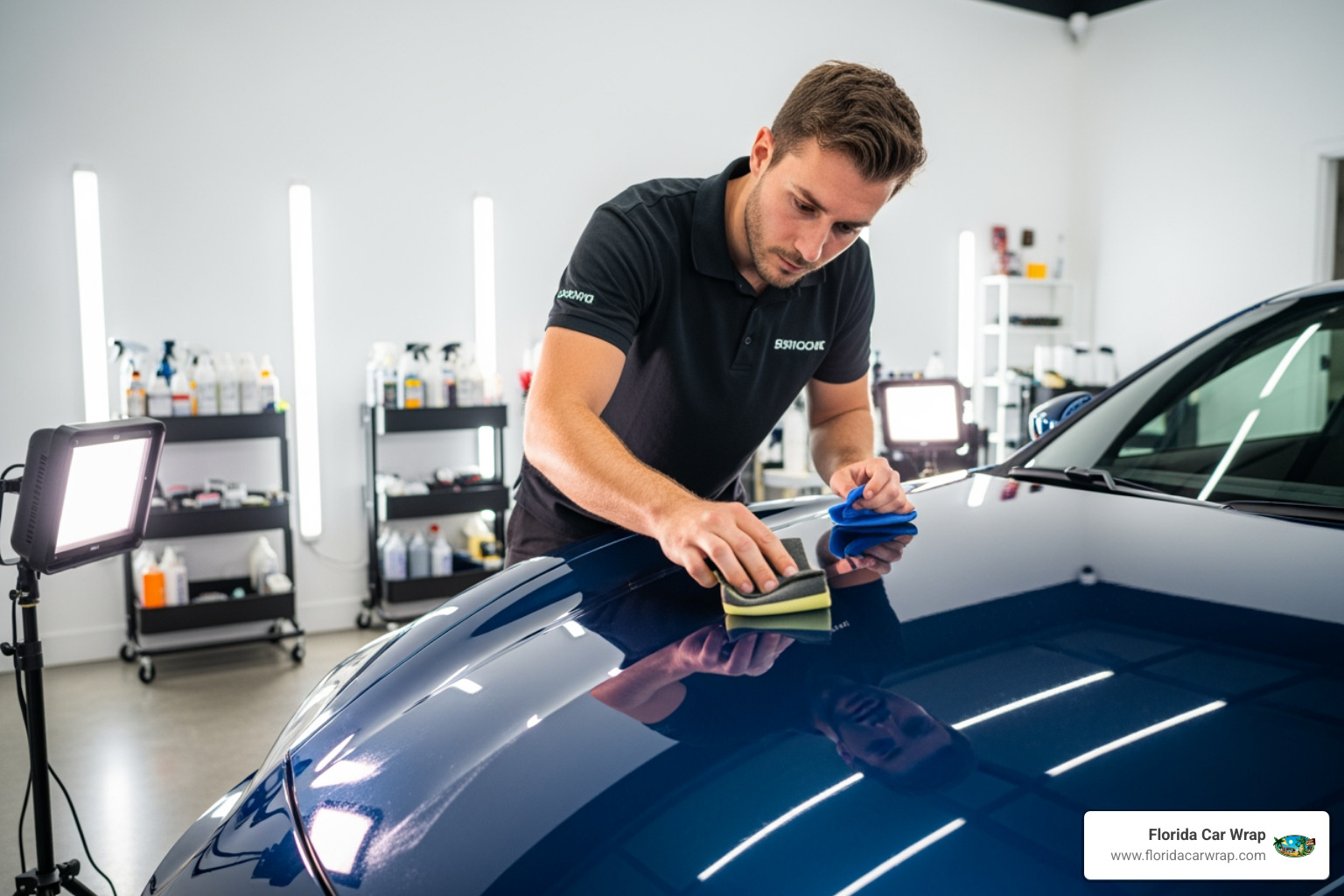
Step 1: Decontamination and Surface Prep
The first stage is achieving a surgically clean surface. We start with a thorough hand wash with pH-neutral soaps. Next, an iron fallout remover dissolves embedded iron particles (like brake dust) that can cause rust spots. Finally, a clay bar treatment gently lifts away any remaining bonded contaminants like tree sap or tar. This leaves the paint perfectly smooth and ready for correction.
Step 2: Paint Correction for a Flawless Base
Ceramic coatings are transparent and will magnify any underlying imperfections. This is why paint correction is the most critical step. Our experts use machine polishing with various compounds and pads to carefully remove swirl marks, light scratches, and oxidation from the clear coat. This multi-stage process restores the paint to a perfect, mirror-like finish, creating the ideal canvas for the coating. Your car will often look better than new before the coating is even applied.
Step 3: Application, Curing, and Maintenance of Your Ceramic Coated Vehicle
With the paint perfected, we apply the coating in a controlled, clean environment. Using a special applicator, we apply the liquid in a precise cross-hatch pattern, section by section. After a short dwell time, we carefully level the product to ensure a streak-free finish. The coating then needs to cure. It’s typically touch-dry in 24 hours but takes 2-3 weeks to reach full hardness. During this time, the vehicle must be kept dry and clean.
Once cured, maintenance is simple. Regular washing with pH-neutral soaps and the two-bucket method will preserve the finish. The coating’s hydrophobic properties make cleaning much easier, but you should avoid automatic car washes with abrasive brushes. With proper care, your vehicle will maintain its stunning appearance and superior protection for years.
Frequently Asked Questions about Car Coatings
We talk to vehicle owners in Davie, Fort Lauderdale, and Miami every day. Here are straight answers to the most common questions about ceramic coatings.
How long does a professional ceramic coating last?
The durability of a ceramic coating depends on three things: the quality of the product, the thoroughness of the prep work, and your ongoing maintenance. While DIY products last 6-18 months, a professionally applied coating offers 2 to 5 years of protection, with premium systems lasting 9 years or more. Professional-grade coatings have a higher concentration of silicon dioxide and form a stronger, semi-permanent bond with your paint, which accounts for their superior longevity.
Does ceramic coating prevent all scratches and rock chips?
No. This is a common misconception. A ceramic coating provides excellent resistance to light scratches and swirl marks thanks to its 9H hardness. However, it will not prevent deep scratches or stop rock chips. The coating is a thin, hard layer, not armor plating. For protection against physical impacts like rock chips, we recommend Paint Protection Film (PPF). For ultimate defense, many clients combine PPF on high-impact areas with a Ceramic Coating and Wraps on the entire vehicle.
Is professional ceramic coating worth the cost?
Yes, and here’s why. A professional service, typically costing $1,000 to $2,000+, is an investment in long-term value. The cost primarily covers:
- Intensive Labor: Hours of meticulous paint correction are required to create a flawless surface, which is essential for the coating to bond properly and look its best.
- Superior Materials: Professionals use high-concentration coatings that are not available to consumers, offering greater durability and protection.
- Expert Application & Warranty: You’re paying for the skill of certified technicians who guarantee a perfect finish, backed by a warranty.
The long-term value comes from preserving your vehicle’s resale value, eliminating the need for constant waxing, and preventing costly damage from UV rays and chemical etching. For vehicle owners in South Florida’s harsh climate, it’s one of the smartest investments you can make to protect your car.
Conclusion: The Ultimate Protection for Your Investment
Your car is a significant investment, and protecting it from South Florida’s intense sun, salt air, and environmental hazards is essential. Modern ceramic coatings offer the best defense, using nanotechnology to create a durable, semi-permanent shield against UV damage, chemical stains, and light scratches.
While DIY products exist, the key to a coating that lasts for years is professional application. The meticulous decontamination and paint correction process performed by an expert ensures a flawless finish and a proper bond that DIY methods can’t replicate.
For vehicle owners in Davie, Fort Lauderdale, and Miami, a professionally installed ceramic coating preserves your car’s value, reduces maintenance, and keeps it looking showroom-fresh for years. It’s the peace of mind that comes from knowing your investment is properly protected.
At Florida Car Wrap, Steve and our team of certified detailers bring over 20 years of experience to every project. We are committed to delivering the highest standard of protection with clear communication and ongoing support.
Ready to give your vehicle the ultimate protection it deserves? Protect your vehicle with the experts at Ceramic Coating at Florida Car Wrap. Let’s keep your car looking its best, year after year.

